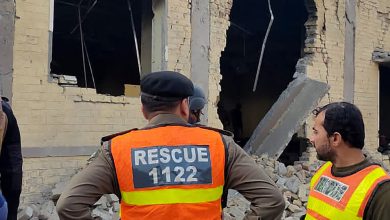In States Banning Abortion, a Growing Rift Over Enforcement

HOUSTON — Deep rifts have emerged among the hundreds of elected district attorneys who will be charged with enforcing the expanding restrictions on abortion, creating a Balkanized new legal system within states that are banning the procedure.
Dozens of Democratic prosecutors who represent liberal pockets in conservative states already have vowed to resist bans by refusing to bring charges against abortion providers. But in many rural areas and outlying suburbs, conservative prosecutors have said they will enforce their state bans.
An opening salvo came this week, just days after the Supreme Court struck down the right to abortion, when a prominent anti-abortion group in Texas urged the police and prosecutors in Dallas and Houston to open criminal investigations into three abortion clinics that the group said were preparing to violate the law by scheduling abortions.
“It is your duty to uphold the law and investigate crimes,” the group, Texas Right to Life, said in its letter, in which it claimed to have phone recordings of clinic employees. “We urge you and your officers to investigate this abortion clinic.”
The demand was quickly made moot when a judge temporarily blocked attempts to resurrect the state’s long-dormant, century-old abortion law in the weeks before a new ban takes effect, but it marked the beginning of an explosive new battle over abortion in America: How prosecutors and the police will enforce laws that criminalize abortion in two dozen states, some of them carrying penalties of up to 15 years in prison.
More than 80 elected prosecutors have already vowed not to. In a joint statement released after the Supreme Court’s decision last week, they said that enforcing abortion bans on what had for decades been a legal medical procedure would degrade public trust, especially for sexual assault victims, and drain resources from prosecuting what they called serious crimes.
“Criminalizing and prosecuting individuals who seek or provide abortion care makes a mockery of justice,” the prosecutors said. “Prosecutors should not be part of that.”
But such protection could be limited. In some states with abortion restrictions, Republican attorneys general could intercede to bring abortion cases even if local prosecutors refuse. In Texas, where district attorneys in five of the state’s most populous counties have said they will not “criminalize personal health care decisions,” a Republican legislator has proposed a law that could empower conservative rural prosecutors to charge urban residents for violating Texas’ abortion laws.
Other schisms are erupting between neighboring cities and counties.
In Michigan, abortion providers could soon face felony charges under an abortion ban that has remained on the books since 1931. But Karen McDonald, the Oakland County prosecuting attorney, said the law was useless and antiquated, comparing it to old statutes banning cows running at large. She said she would not enforce an abortion ban.
Ms. McDonald, a Democrat who supports abortion rights, said her office was already overburdened trying to address epidemics of gun violence, fentanyl overdoses and domestic violence. She said she would not peel away resources to prosecute people for what she considered a constitutional right.
“I will never take part in a prosecution that is designed to take away a woman’s right to decide her reproductive freedom,” she said.
But next door in Macomb County, Prosecutor Peter Lucido, a Republican, has said publicly that he would enforce the ban if it is upheld in court. The law has been suspended by a state judge after challenges from abortion rights groups.
From Opinion: The End of Roe v. Wade
Commentary by Times Opinion writers and columnists on the Supreme Court’s decision to end the constitutional right to abortion.
- Michelle Goldberg: “In the aftermath of the anti-abortion movement’s catastrophic victory, it’s worth asking what we can learn from their tactics.”
- Maureen Dowd: “The court is out of control. We feel powerless to do anything about it. Clarence Thomas, of all people, has helped lead us to where we are.”
- Peter Coy: “People on the losing end of Supreme Court decisions increasingly feel that justice is not being served. That’s a scary situation for American democracy.”
- Jamelle Bouie: “The power to check the Supreme Court is there, in the Constitution. The task now is to seize it.”
- Michele Goodwin, law professor: “The overturning of Roe v. Wade reveals the Supreme Court’s neglectful reading of the amendments that abolished slavery.”
And in Grand Rapids, the Kent County prosecutor vowed to enforce the existing 1931 ban and prosecute doctors, saying he would not “turn a blind eye” and ignore what he called a valid law.
It is unlikely that even the most vociferous promises of protection from Democratic prosecutors will persuade abortion clinics to remain open in defiance of state bans.
So far, there have been few concrete actions by prosecutors, in part because many abortion clinics in states that had adopted bans quickly stopped providing services after the Supreme Court’s decision.
“I believe that most providers, and certainly Planned Parenthood, intend to follow the law,” said Helene Krasnoff, vice president for public policy litigation and law at Planned Parenthood Federation of America. At the same time, she said, some people will violate the bans because “patients are going to be desperate.”
Abortion rights groups said there could be serious consequences if law enforcement officials moved to aggressively investigate and prosecute abortions as crimes.
While existing laws largely exempt women who get abortions, defense lawyers and abortion rights groups are worried that zealous prosecutors could bring cases against anyone who helps them get abortions, or abortion pills. Advocates say the 2014 case of a Pennsylvania mother who was jailed for ordering abortion pills for her teenage daughter is a harbinger.
“It’s open season,” said C. Melissa Owen, a criminal defense lawyer in Charlotte, N.C., who has studied laws criminalizing abortion. “Best friends, aunts, mothers, boyfriends, receptionists, nurses — anyone providing care or assistance falls under the umbrella of being a co-conspirator.”
In Oklahoma, where an abortion ban from the moment of fertilization went into effect on Friday, the attorney general, John O’Connor, promised that there would be immediate enforcement, including against those who “solicit” abortions, and said that could include companies that have said they would support employees traveling out of state for abortions.
“I would say if you put up a billboard, or if you advertise that you’re going to provide abortions in Oklahoma or in another state, that you’re soliciting an abortion,” Mr. O’Connor told reporters.
Abortion rights researchers say prosecutors have for years employed homicide and child-abuse laws to charge women who induce abortions, suffer miscarriages or use drugs during pregnancy.
Some 1,300 women have faced such charges or arrests since 2006, according to National Advocates for Pregnant Women.
In one of the most recent cases, a 26-year-old woman in a Texas border county was briefly charged with murder in April in connection with what authorities called a “self-induced abortion.” A statement from a sheriff’s official had said the woman had been indicted on a murder charge for “intentionally and knowingly” causing an individual’s death, but the local district attorney quickly scuttled the charge amid a public outcry, saying she had not violated Texas law.
An Indiana woman was convicted of “feticide” in 2015 and sentenced to 20 years in prison for a self-induced abortion, before her conviction was overturned. Though feticide laws are ostensibly written to address violence inflicted on pregnant women, activists say prosecutors often use the laws to charge women themselves.
Even in California, which has burnished itself as a lifeboat for women in need of abortions, there have been two recent cases in which women were charged with homicide after delivering stillborn babies.
The Supreme Court’s Roe decision could also put new muscle into “personhood” laws that give full legal rights to embryos from the earliest stage of development. Abortion rights groups fear that pregnant women could be at greater legal risk of being charged with homicide or child abuse if they miscarry, induce an abortion themselves or use recreational drugs or even prescription medication during pregnancy.
There are also privacy worries that prosecutors will subpoena women’s medical records and private social media files as part of criminal investigations into abortion providers. Already, some abortion rights advocates have urged women to delete apps that track menstrual cycles for fear their data could end up in a law enforcement dragnet.
“The women themselves are the source of evidence, whether it’s their body through exams or insisting on testimony and putting them up for public testimony in court,” said Leslie Reagan, a professor of history at the University of Illinois, Urbana-Champaign, who has looked at how abortion was criminalized in the years before Roe v. Wade. “Women were punished by the state through that interrogation process.”
In Dallas, the local district attorney, John Creuzot, has vowed to use his prosecutorial discretion when it comes to cases under a new Texas law, set to take effect this summer, that will ban nearly all abortions. “My office will not stand in the way of them seeking the health care they need,” Mr. Creuzot said in a statement.
But there was a very different message from prosecutors just over the county line in Tarrant County, a traditionally conservative bastion that includes the city of Fort Worth, the last major Texas city with Republican leadership.
“We do not choose which laws we follow,” the district attorney, Sharen Wilson, said in a statement. “If the facts warrant prosecution, then the case will be presented to a grand jury for consideration.”
Some Democratic prosecutors are uneasy about declaring their districts safe havens for abortions, worried that any explicit vow not to enforce the law could be used as grounds for their own removal by Republican leaders.
“Prosecutors and police should have no role in matters between doctors and patients,” said Kim Ogg, the district attorney for Harris County, which includes Houston. “As in every case, we will evaluate the facts and make decisions on a case-by-case basis.” She added that her office “did not want to take the chance of being found to be in dereliction of our duty or to risk having abortion cases turned over to Texas Attorney General Ken Paxton.”
Others, like the Travis County district attorney, José Garza, have been more direct and categorical.
“We will not prosecute people who seek abortions or people who provide abortion services,” Mr. Garza said in a news conference on Monday.
The split among district attorneys could likely affect how the law is enforced by the local police, for whom the situation is fraught and still evolving.
Chief Jimmy Perdue of North Richland Hills, Texas, said he anticipated that investigations would include an examination of online and digital records related to potential violations of the abortion ban, as is common in most criminal cases. Any need to obtain health records would add to the difficulty, he said.
“I don’t foresee anyone, any law enforcement agency striking out on their own to take overt, aggressive actions,” said Chief Perdue, who is also president of the Texas Police Chiefs Association. “I think it will be a very slow, wait-and-see the landscape of what guidance we’re given.”





